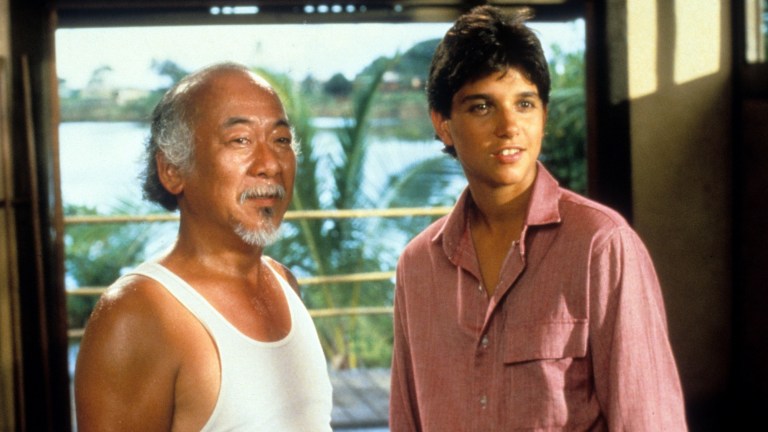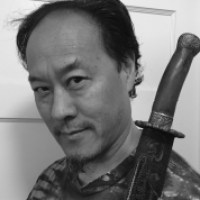The Karate Kid and the True Story Behind Mr. Miyagi
Forty years ago, Mr. Miyagi inspired a generation of children to take up the martial arts. But his movie magic his based on several real karate legends.

“Wax on, wax off.”
This classic line from The Karate Kid is ingrained in our minds as the epitome of cinematic martial arts lessons. It captures the elfin broken English of Mr. Miyagi in all his humble and quirky charm. Miyagi won our hearts as the kindly sensei, and the role earned Noriyuki “Pat” Morita (1932-2005) a nomination for a Best Supporting Actor Oscar. But did you know that Mr. Miyagi was based on a real person? Actually, he was based on three people, all famous karate masters. Here are their stories.
The Legendary Grandmasters of Karate
Mr. Miyagi gets his name from Grandmaster Chojun Miyagi (1888-1953), the founder of an Okinawan style of karate called Goju-Ryu. Goju means “hard-soft,” and Ryu in this context means “school” (it can also mean “dragon,” which is why it appears a lot in anime, manga, and the Street Fighter franchise). Goju-Ryu is still a popular style of karate, practiced worldwide to this day.
“It’s no coincidence that when Hollywood was looking to create the archetypal karate master, it chose the name Mr. Miyagi,” writes Goran Powell in his historical fiction novel Chojun. “While other masters may have created larger schools or led more colorful fighting lives, Miyagi was the epitome of the Okinawan karate master, powerful and humble, stern and kind, simple and wise.”
Robert Mark Kamen, the screenwriter behind The Karate Kid, studied Goju-Ryu. He took up the martial art after getting beat up by bullies at the 1964 World’s Fair in New York, just like Daniel LaRusso (Ralph Macchio). Being bullied lies at the heart of any underdog tale, and Daniel was the ultimate underdog. Kamen used his own experience of being a victim of bullying as well as his martial arts training as inspiration for The Karate Kid. Kamen’s first instructor was militant and cruel, which inspired Kreese (Martin Kove). Kamen left that sensei, moving on to train at a Goju-Ryu dojo. There he discovered its legendary founder, Chojun Miyagi.
Beyond his namesake, Kamen claimed the character of Mr. Miyagi was inspired by a direct disciple of the real Miyagi, Sensei Meitoku Yagi (1912-2003). Yagi began training under Miyagi when he was only 14 years old. In 1963, a decade after the founder’s death, the Miyagi clan recognized Meitoku Yagi as the successor of Okinawan Goju-Ryu. In 1986, Emperor Hirohito proclaimed Yagi as a Living National Treasure of Japan.
Little of this backstory made it into The Karate Kid, but in retrospect it was clearly underpinning the lore and set up plenty of clever Easter eggs for the following franchise. Nods to Chojun Miyagi and Goju-Ryu are revealed in the sequels. In The Karate Kid Part II, Mr. Miyagi and Daniel travel to Okinawa, and while it is never explicitly said, it’s clear that the style of karate being referenced is Goju-Ryu. Miyagi shares a tale about how the founder of Miyagi-Do studied martial arts in China, which is parallel to what Chojun Miyagi did, as well as his teacher, Higaonna Kanryo (1853–1916). What’s more, The Karate Kid Part II reveals that Miyagi’s father and teacher was named Chojun Miyagi (Charlie Tanimoto). It lends martial authenticity to the Karate Kid franchise without overshadowing the story.
The Pioneering American Karate Grandmaster
The third master who helped inspire Mr. Miyagi was Fumio Demura (1938-2023). Demura was Morita’s stunt double in The Karate Kid, as well as featured in the third and fourth sequels. Demura was a pioneering master of karate in America. He first came to the U.S. in 1965, and in the 1970s and ‘80s authored many of the first books in English on karate. He wrote the first significant English language book on nunchaku. As a result, he ended up coaching Bruce Lee on what would become Lee’s signature weapon (nunchaku is traditionally a Japanese weapon and Lee’s roots were in Chinese martial arts, so Lee’s usage was an instance of cultural appropriation, but who’s going to call him out on it now?).
Kevin Derek was a student of Demura and has made two documentaries related to The Karate Kid. The Real Miyagi is about Demura and More Than Miyagi: The Pat Morita Story is about Morita. When he was a teenager training under Demura, Derek met Morita in person. Morita attended one of Demura’s tournaments when The Karate Kid was still in production. “I think he was trying to perfect his accent,” Derek claimed. “Because if you watch him talk, it’s very close to how my sensei talks.”
In real life, Morita didn’t have an accent. He was a native Californian who was interned as a child during World War II, along with many other Japanese Americans. Knowing his personal history makes the emotional scene when a drunk Miyagi discusses his role in the war with Daniel all the more poignant.
What’s more, Morita had no experience in the martial arts prior to The Karate Kid. The closest he came was a bit part in Bob Hope’s final theatrical 1972 film, Cancel My Reservation, where he played a karate instructor named Yamamoto. Morita was a stand-up comedian who went by the nickname ‘the Hip Nip.’ He had appeared in supporting roles in several movies and TV shows playing Japanese, Chinese, and Korean characters. However, he was most famous for his reoccurring role as Arnold in the sitcom Happy Days when The Karate Kid began production.
Demura was the perfect body double for Morita. Not only was he a true master of karate, but he also shared the same stocky body type as Morita. Nevertheless, a keen viewer can spot Demura in action during the pivotal fight scene when Miyagi saves Daniel from the skeleton-costumed Cobra Kai bullies.
No other actor could have better brought all these elements together for Mr. Miyagi than Pat Morita. The role of Mr. Miyagi was originally conceived for Toshiro Mifune, the veteran Japanese actor who starred in numerous classics directed by Akira Kurosawa. However, Mifune did not speak English so that didn’t work out. With Mifune’s penchant for gruff and coarse characters, it’s hard to imagine Mifune as Miyagi. Morita’s timeless portrayal of Mr. Miyagi remains his shining legacy, the heart and soul of The Karate Kid.
Sony Pictures Home Entertainment is releasing The Karate Kid 40th Anniversary Edition on 4K Blu-ray which will use collectible retro VHS packaging on June 18, 2024.
